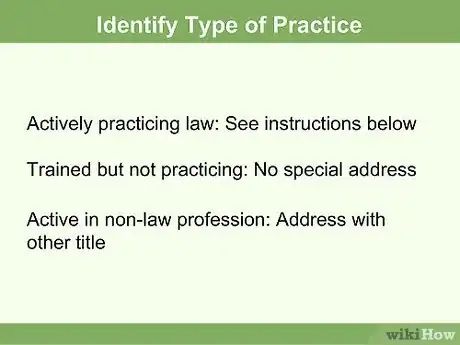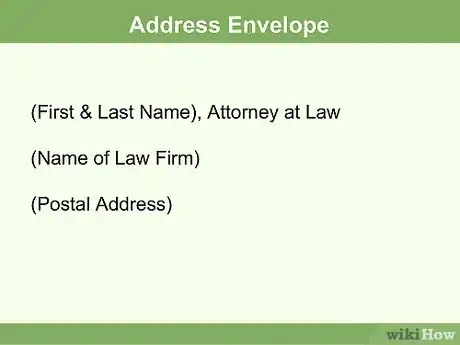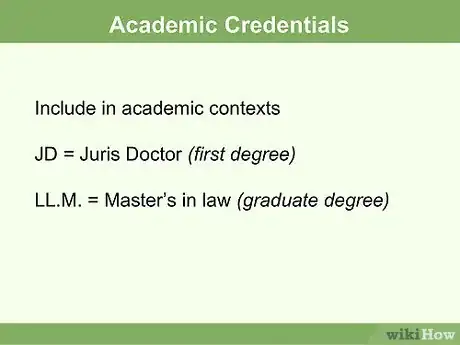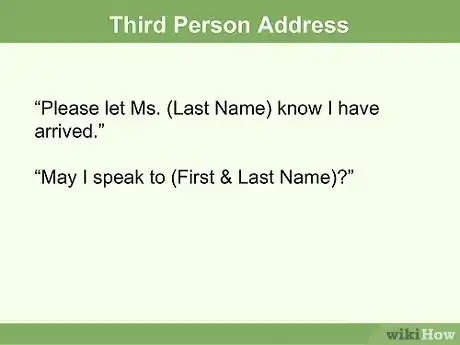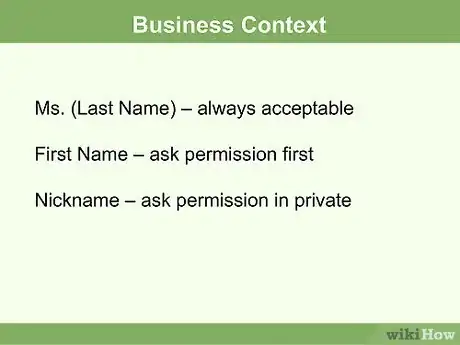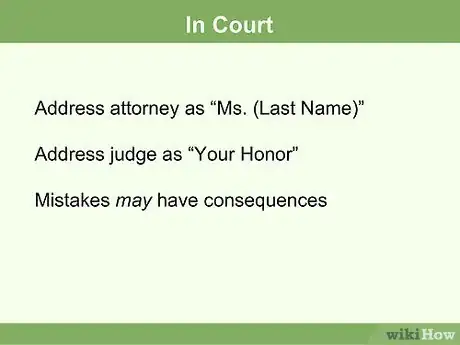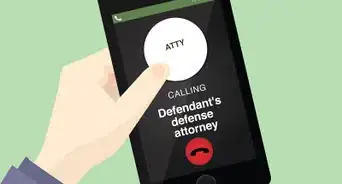This article was co-authored by Clinton M. Sandvick, JD, PhD. Clinton M. Sandvick worked as a civil litigator in California for over 7 years. He received his JD from the University of Wisconsin-Madison in 1998 and his PhD in American History from the University of Oregon in 2013.
This article has been viewed 95,652 times.
Approximately one-third of all practicing attorneys in the United States are women, and women make up more than half of modern law school graduating classes. [1] Just like their male counterparts, female attorneys expect and deserve respect for their profession. Address a female attorney with the same presumption of authority that you would a male attorney.
Steps
Addressing Correspondence to a Female Attorney
-
1Determine if you are writing to an attorney or a lawyer. Even though the terms are often used interchangeably, there is a difference. A lawyer is someone who has trained in the law, usually by attending law school. An attorney is someone who has passed the bar exam and is actively practicing law.
- If you are writing to a woman who has been to law school, but is not practicing law, for example the manager of a company, address her as you would any other professional with the relevant term. [2]
-
2Use "Dear Ms. [name]" whenever possible to open a business letter to a female attorney. This traditional salutation is short, to the point, professional, and polite. Showing simple respect and manners puts your best foot forward in your communications.
- Modern names have often become unisex. If you are unsure if "Morgan" or "Taylor" is a man or woman and you can't verify it, open your business letter with the attorney's full name, "Dear Morgan Smith:" [3] [4]
- If you don't have a specific name, avoid worn-out cliches like "To Whom It May Concern." Examples of modern generic salutations include "Dear Sir or Madam," or "Dear Legal Department." [5]
- Use proper salutations in your email to a female attorney as well.
Advertisement -
3Address the envelope with her full name and either "Attorney At Law" or "Esquire." Do not use "Ms." on the envelope. For example, "Mary Smith, Attorney At Law." The next line would be the name of her law firm if applicable, then the address. [6]
- Esquire, or Esq., is also always correct when addressing an envelope to a female attorney. However, it is a dated term that is falling out of common usage. Some consider it pretentious. Attorney At Law is the more modern form of address.
-
4Use educational credentials in academic publications. If you are writing a letter or program for an academic institution and reference either a lawyer or a practicing attorney, follow her name with her degree. You can either use "JD" or "J.D." for Juris Doctor. If the person has an advanced law degree, add that as well. The most common is "LL.M" for a master's degree in law. [7]
Addressing a Female Attorney in Person
-
1Use formal address when you are dealing with staff. When you call the office or arrive for an appointment, ask for your attorney by either "Ms. Smith, please," or "May I speak to Mary Smith?"
-
2Use the female attorney's preferred form of address in meetings. You may be very comfortable with your attorney or know her socially outside of the office. However, in public meetings, you are in a business environment and should observe formalities. In private meetings, some attorneys are comfortable with first names, others aren't. Even with an attorney you know well, you shouldn't use nicknames without permission. Don't be afraid to ask if you are unsure how to address your attorney when in private meetings.
-
3Observe strict formalities while in court. Some courts are more formal than others, but you should always refer to your attorney by honorific/surname (Ms. Smith) while in the courtroom, regardless of your social relationship. A typical courtroom etiquette rule requires all persons present to use titles and surnames. Ignoring these rules can result in sanctions ranging from a stern warning to cancellation of your hearing to being held in contempt for disrespect to the court.
- Always refer to a judge, whether male or female, as "Your Honor."
- The term "counselor" is very formal and usually only used in court between the judge and the other attorneys. It is not wrong to refer to your attorney as "counselor," especially if the attorney in question is non-binary, but the honorific/surname is preferred.
References
- ↑ http://www.americanbar.org/content/dam/aba/marketing/women/current_glance_statistics_july2014.authcheckdam.pdf
- ↑ https://www.formsofaddress.info/mrs_ms/
- ↑ http://www.businesswritingblog.com/business_writing/2006/01/greetings_and_s.html
- ↑ https://www.formsofaddress.info/mrs_ms/
- ↑ http://www.businesswritingblog.com/business_writing/2006/01/greetings_and_s.html
- ↑ https://www.formsofaddress.info/attorney/
- ↑ https://llm-guide.com/what-is-an-llm
About This Article
To address a female attorney, whether in person or through a letter, you generally want to show personal and professional manners by using “Ms.” in front of her name. Alternatively, especially when communicating through writing, you can’t go wrong by just using the person’s full name. Also, in meetings and formal business, show consideration by asking your attorney what names or titles she prefers so you don’t offend her by mistake. For our Legal reviewer’s advice on how to observe formalities in court, scroll down.
